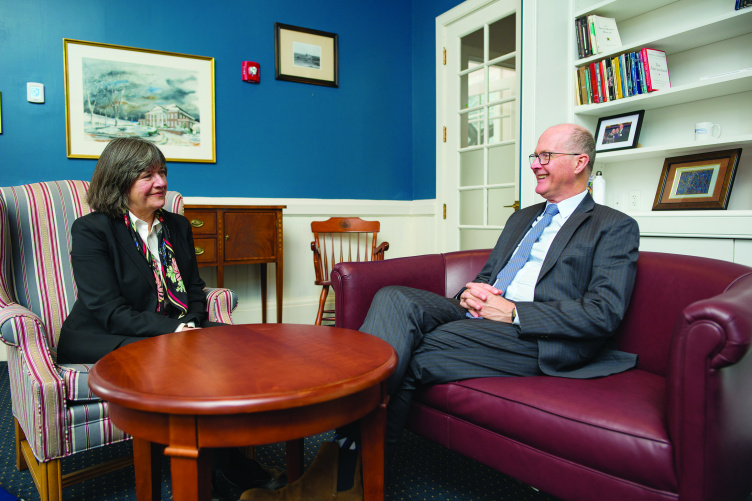
James W. “Jim” Dean Jr. became UNH’s 20th president in June 2018, following a two-decade career at the University of North Carolina at Chapel Hill, where he most recently served as executive vice chancellor and provost. Co-author of a forthcoming book (Inside Universities, University of North Carolina Press) that explores the intersection of higher education and business, he spoke with senior vice provost for research Jan Nisbet about partnerships, research and his vision for UNH.
Do you see new opportunities for partnerships that would support post-doctoral, graduate and undergraduate student research?
Yes. We’re already addressing some of the most important issues facing New Hampshire, but I’d like for us to say confidently that we’re doing research on all those issues. And nearly every business leader I’ve met with in the past few months has talked about some way UNH research can help them. For example, Manchester-Boston Regional Airport is interested in working with our data analytics folks to support its effort to get more people to fly in and out of that airport.
What do you wish business and industry partners better understood about universities?
I devote one chapter of my book to how businesses and universities are similar, and how they’re different. Businesses probably see the similarities more accurately, but I believe the fundamental difference is that businesses, as for-profit entities, have one overriding constituency — the owners — and need to satisfy their desire for return on their investment. Universities are much more complex. As president of UNH I have to be concerned about the state as a whole, our elected leaders, my fellow leaders here, our faculty unions as well as associations that represent the staff, the graduate and undergraduate students and their elected representatives, the local community in Durham … and I’m probably leaving some out.
What’s an insight from your forthcoming book that will affect your leadership at UNH?
I learned an awful lot about public universities’ massive, non-negotiable responsibilities to protect the first amendment. Universities have very, very limited ways in which they can keep people from speaking; we have far less flexibility than some people might think. Personally, I’m a big free speech guy so that wasn’t disappointing to me. I’m really happy about UNH’s top “green light” rating from the Foundation for Individual Rights in Education.
What are your aspirations for UNH research over the next five years?
Our goal of transforming UNH into one of the top 25 public universities in the country is a bold one, and expanding academic and research excellence is essential to it. Everyone here is absolutely delighted that we’ve attained the Carnegie R1 status as one of the top 130 universities in the country for research, and one of 43 without a medical school, and retaining that is an important goal. I also want us to make sure our faculty are leaders in identifying and addressing the most important issues here in New Hampshire, across the country and around the world.
What book that you have read in the past year has impressed you?
I read a lot, but Walter Isaacson’s biography of Leonardo da Vinci stands out. People think of da Vinci as a painter, but he made breakthroughs in the science of optics as well, bringing science to art in a way that was beautiful. There’s science behind the famous gaze of the Mona Lisa.
-
Compiled By:
Beth Potier | UNH Marketing | beth.potier@unh.edu | 2-1566
















































